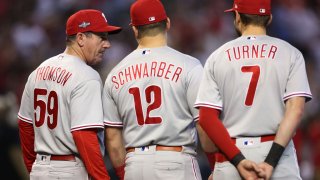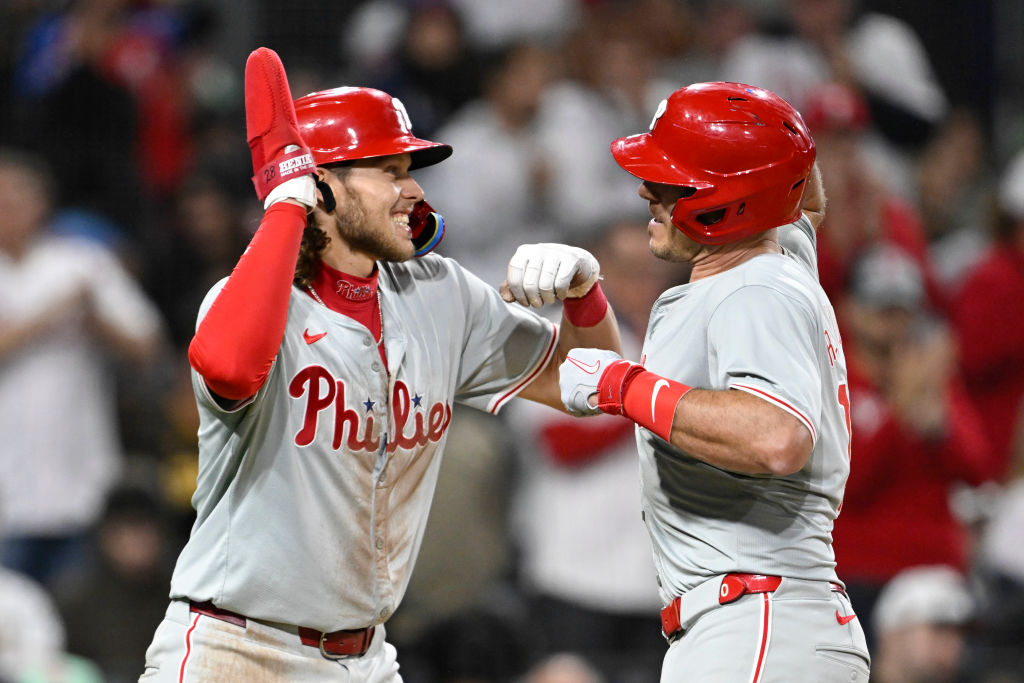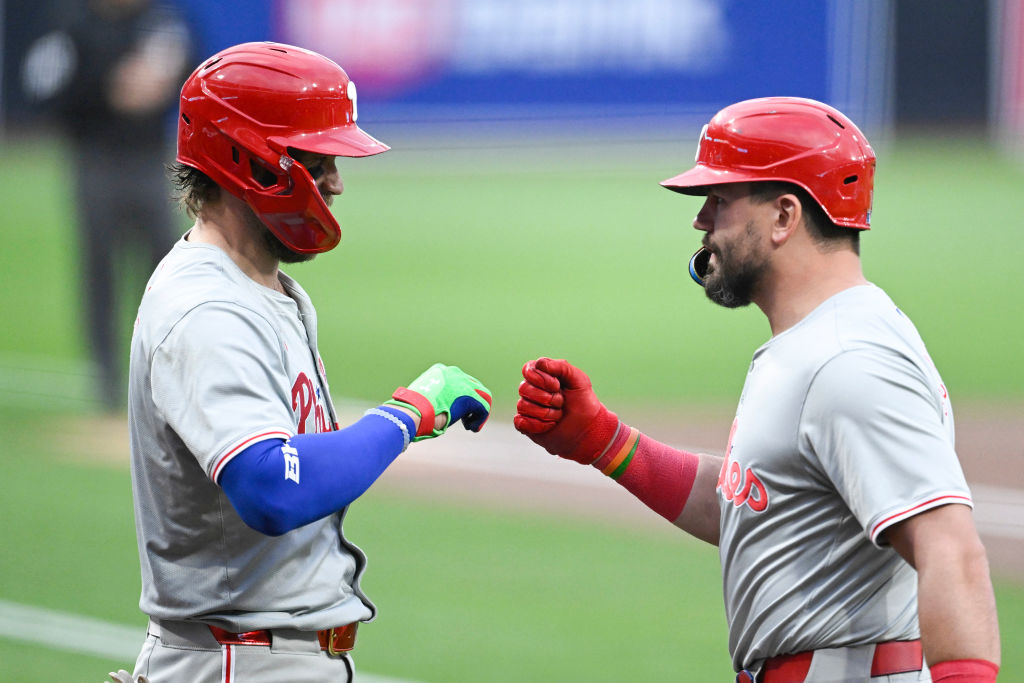
Over the next two weeks leading up to Phillies Opening Day on March 28, we're taking a daily look at the biggest questions and storylines surrounding the team in 2024.
This just in: The Phillies plan to get off to a fast start this year.
Golly. Who could have seen that coming after back-to-back Aprils and Mays overflowed with angst and concern and fan discontent and fingernails chewed down to the nub?
Stay in the game with the latest updates on your beloved Philadelphia sports teams! Sign up here for our All Access Daily newsletter.
When the calendar flipped to June last year they were in fourth place, eight games out of first. Exactly one year earlier they were seven games under .500, 12½ games off the lead and manager Joe Girardi had just been canned. In both cases, all that realistically remained was trying to earn a wild-card spot. So, yeah, nobody down at 1 Citizens Bank Way has fond memories of those bleak times and showed up at spring training this year thinking, "Hot damn, let's see if we can do THAT again."
As a result, all the proper lip service has been paid to the notion that jetting out of the gates as soon as the regular season opens against the Braves at The Bank on March 28 is a top-of-mind priority.
Getting off to a good start is better than getting off to a bad start, right? Was it Abner Doubleday who first figured that out?
There are just these pesky little details that keep getting in the way of the narrative that this is a do-or-die proposition and that what happens before school is out for the summer will set the tone for all that follows.
Philadelphia Phillies
Like the fact that, despite there being enough concern in 2022 to change managers, the Phillies then advanced all the way to the World Series ... where they lost to an Astros team that had been in third place on May 1.
Like the fact that last season, they recovered and made another strong postseason run, making it all the way to the NLCS before being upset by the Diamondbacks.
Or this:
PHILLIES SPLITS IN DIVISION SERIES ERA (1994-PRESENT)
| Year | First Half | Second Half | Result |
| 2023 | 48-41 | 42-31 | Lost NLCS |
| 2022 | 49-43 | 38-32 | Lost World Series |
| 2011 | 57-34 | 45-26 | Lost NLDS |
| 2010 | 47-40 | 50-25 | Lost NLCS |
| 2009 | 48-38 | 45-31 | Lost World Series |
| 2008 | 52-44 | 40-26 | Won World Series |
| 2007 | 44-44 | 45-29 | Lost NLDS |
That's right. The Phillies have made it to the postseason seven times since the playoffs were expanded 30 years ago, and they've had a better winning percentage after the All-Star break than before every time.
It's not a local phenomenon, either. On Memorial Day in 2019, the Washington Nationals were 22-32, in fourth place and already nine games out. And won it all.
Charlie Manuel managed 10 full seasons in the big leagues, including five postseason appearances. He's the winningest manager in Phillies franchise history. And every one of his Phils and Indians teams finished stronger than they started. Every. Single. One.
In short, he's earned the right to opine on the subject. And while he agrees that a fast start, like getting old, beats the alternative every time, he has a more nuanced perspective about how critical it really is.
"I look at it as that in the first part of the season, you've got to keep your head above water," he told NBC Sports Philadelphia recently. "If you come out kind of slow and get behind, you can't panic. But there is a time when you can get too far behind and it's hard to catch up. I'd definitely rather get in first place when the season starts and stay there. But that's hard to do."
Nearly two months into the 2005 season, his first with the Phillies, his team was sitting in fifth place in a 5-team division. Before a game against the Marlins at Dolphins Stadium, general manager Ed Wade gestured toward the flags flying at the top of the ballpark, flags that were arranged in order of the current standings.
"And he said to me, 'Look at that. We're in last place.' Kind of derogatory like," Manuel recalled. "I said, 'We're not going to finish there' and he said, 'Well, I hope not.'" Sometimes in the season, you hit a rough go and that makes you grow up."
The Phillies then won nine of their next 10, lost once and then won another six in a row. And while they didn't quite get over the finish line, they finished just two games behind the first-place Braves in the division and would have claimed a wild-card spot had the Cubs been able to hold onto a sixth-inning lead and beat the Astros.
"The biggest thing is that your team can improve during the season," the manager continued. "They can become closer because they can't wait to get to the park. That tells you that they're coming together. And somewhere in the season, I'd say from the All-Star break to the end of the year, you should definitely peak. And when you peak, you want to be in the race."
Manuel and former All-Star second baseman Chase Utley had dinner together during Phillies Phantasy camp in January.
"We were laughing and he goes, 'I used to hate you," Manuel said. "'What do you mean by that?' 'I used to hate you because you'd make me get on the bus and ride to (road spring training games). But now that I think about it, I think it helped us because we were around one another more as a team.'"
While getting off to a fast start is a time-honored baseball mantra, the reality is that teams that do an early pratfall have a far lot more leeway now than they used to. The expanded playoff field allows fully 40 percent of teams to reach the postseason. Taking into account that several clubs each year are either in a rebuilding mode, have purged salary or are otherwise non-competitive, playoff invitations aren't nearly as exclusive as they used to be. Even teams with losing records going into the home stretch are often still within hand-shaking distance of a spot.
And that doesn't even begin to address the ongoing, and still unresolved, debate over whether amassing enough wins to get a first-round bye is a curse or a blessing. It's still a small sample but, in the two years since the postseason field was enlarged once again by adding yet another participant from each league, five of the eight teams who had the best records in baseball and earned the right to sit out the Wild Card round have lost in the Division Series.
After playing nearly every day for six months, four or five days off causes a team to lose its mojo. Especially against a team coming off a literal win-or-go-home series. Or so the theory goes, anyway.
Despite all that, like most managers, Manuel is a cum laude graduate of the A-Win-In-April-Counts-The-Same-As-A-Win-In-September School of Thought.
The reasons are pretty obvious. Winning from the jump allows managers to rest position players and relievers to an extent. It leaves more margin for error in case of a major injury or slump by a star player as the schedule is running out. The higher the seeding, the better the chance of more postseason home games.
It also keeps the front office happy since, as a rule of thumb, the more games a team wins, the more tickets it sells.
Besides, professional athletes tend to be highly competitive. Their mindset is to win. There are no circumstances under which a manager is going to call a team meeting and say, "Fellas, listen up. We just won six in a row. Let's go out there and lose tonight and tomorrow. We don't want to get off to too fast a start, you know."
FWIW Manuel, who works for the team as a special advisor, is bullish about the Phillies' chances of executing their plan to improve in the first two months this time around.
"The last two years they've gotten to know each other pretty good. They've got basically the same team. So I think they have a chance to get off to a good start," he said. "They get along. They've got a lot of good camaraderie. That's what I've really seen over the last two years, especially from the middle of the season on.
"But if they come out and don't get off to a good start, I think they can still have a big finish like they've done the last few years."
Because, as they say in baseball, it's usually not how you start that matters most. It's how you finish.


